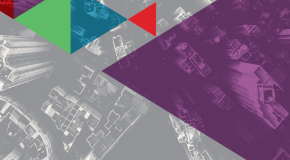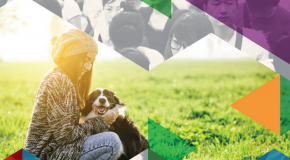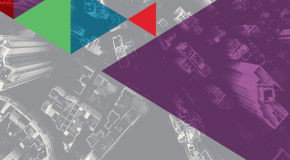- Despite its vast sprawl, Beijing’s environment for overcrowding rated worst by residents
- Both Beijing and Shanghai report higher levels of mental pressures related to urban living than Hong Kong, Singapore and Taipei
- Singapore and Hong Kong, however, show the highest worries about overcrowding in future, likely due to migration and urban-planning policies
City dwellers in Asia face new pressures given the rapid pace of urbanisation throughout the region. With people pouring into cities at an astonishing clip, stress is on the rise and mental health is coming under strain.
A new study, released today by The Economist Intelligence Unit (EIU), assesses the burden overcrowding places on residents across greater China and South-east Asia, and the steps they are taking to relieve the pressure of urban life.
Making space, supported by Pure Group, is based on the findings of a survey of 1,000 residents across five cities in Asia: Beijing, Hong Kong, Shanghai, Singapore and Taipei. The findings are summarised via an infographic and analysed in two insight pieces, available for download here.
The study reveals that sheer population density is not the chief determinant of mental pressures across the study geographies—residents of Beijing and Shanghai, which are relatively spread-out compared with the other cities, are more likely to say they lack personal space. People in Beijing, the most sprawling city in the sample, are also more likely to say their city suffers from overcrowding and that getting around their city is a stressful experience.
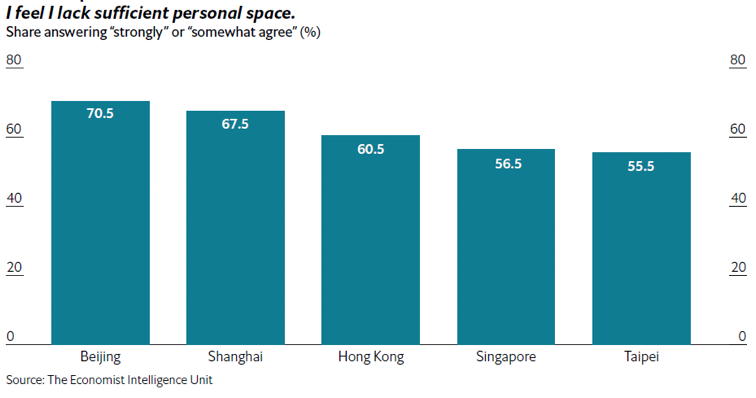
In many respects, sprawl is worse than density; the former can lead to grinding daily commutes and isolate people from access to goods and services, according to Layla McCay, a global expert interviewed for the study. The rapid pace of change seen in mainland China may also account for the mental pressures reported, says Chen Juan, a leading authority on Chinese urbanisation.
However, Singaporeans and Hong Kongers worry most about the future of overcrowding in their cities. This could be due to inflows of migrants to the latter two cities, which have inspired a backlash among some. In contrast, the mainland Chinese cities in the sample have enacted sweeping reform efforts in recent years, including restricting migrants and capping population growth.
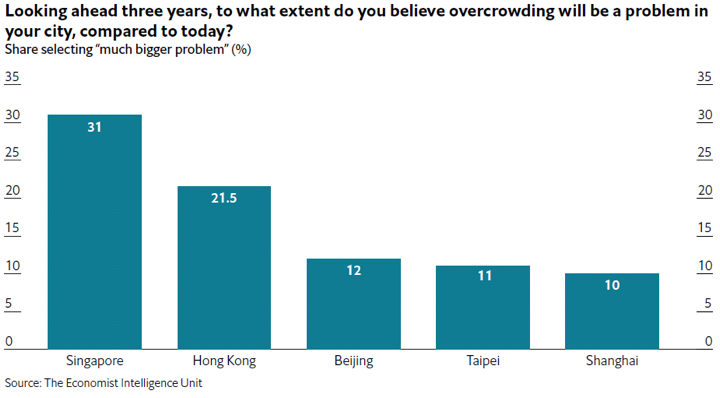
When it comes to relieving stress, city residents are utilising a number of different outlets. The top-ranked methods are watching TV/movies/online video, exercise/fitness and hiking/outdoor activities, followed by socialising with friends and family and shopping.
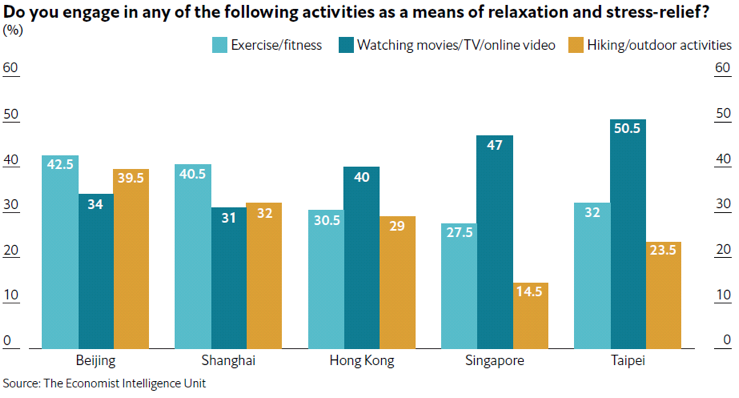
According to Michael Gold, EIU editor of the report, “The extent to which urbanisation impacts the mental well-being of people in Asia’s largest urban areas is only starting to be understood. Though ultra-dense cities have their drawbacks, they can relieve mental pressure by boosting convenience and the availability of goods and services, while sprawling cities can have the opposite effect.”
Press enquiries:
Briony Lin, assistant marketing manager, content solutions, Asia-Pacific
+852 2585 3843
Michael Gold, senior editor, thought leadership, Asia-Pacific
+852 2585 3886
About The Economist Intelligence Unit:
The Economist Intelligence Unit is the world leader in global business intelligence. It is the business-to-business arm of The Economist Group, which publishes The Economist newspaper. The Economist Intelligence Unit helps executives make better decisions by providing timely, reliable and impartial analysis on worldwide market trends and business strategies. More information can be found at www.eiu.com or www.twitter.com/theeiu.
About Pure Group:
Founded in 2002 and headquartered in Hong Kong, Pure Group is a leading premium lifestyle brand in Asia that includes Pure Yoga, MyPureYoga.com, Pure Fitness, Pure Apparel and nood food. Pure Group has locations in Hong Kong, Shanghai, Singapore, Taipei and New York. Pure Yoga has a wide variety of yoga and meditation classes and private yoga programmes, including workshops with renowned teachers from all over the world. Pure Fitness offers strength and cardio training in addition to dynamic group classes led by passionate world-class instructors. Together with Pure Apparel’s performance activewear and nood food’s innovative organic health foods and cold-pressed juices, Pure Group is an integrated community dedicated to helping people lead a happier, balanced 360-degree lifestyle. The Group currently has over 80,000 clients and more than 1,900 employees.


